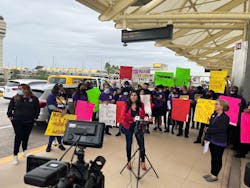Airport Workers Strike, Protest Unequal Treatment at Airports
Airport workers in Orlando are walking off the job to protest long hours, unsafe working conditions and erratic schedules exacerbated by waves of flight delays and cancellations. Airport workers nationwide who sanitize airplanes, assist disabled passengers and secure terminals are demanding airlines and their contractors commit to setting national wage and benefits standards for contracted airport workers who have endured the risk and instability of a global pandemic. Airport Workers United, Service Employees International Union (SEIU) issued a news release Thursday afternoon.
“I only make $10 an hour, which to me is a starvation wage. We don’t have any benefits — no sick leave, no vacation, no benefits whatsoever,” said Joseph Gourgue Sr., a wheelchair assistant for United and American Airlines at Orlando International Airport who is going on strike. “I caught COVID-19. I was home for two weeks. I wasn’t paid for my sick days. I don’t have any sick leave. When we are short of staff, it creates a lot of problems for the passengers because sometimes they miss their flight.”
In October, flight cancellations originating in Texas and Florida sent ripple effects across the aviation system, resulting in thousands of delays and cancellations. Airlines received $54 billion in federal relief to make sure the national air travel system remained strong, aviation jobs were protected and airlines were ready to take off the moment people were ready to connect with loved ones.
“Today, United Airlines could make sure everyone that assists their passengers and secures the airport is paid at least $15 and can see a doctor when they are sick, but they don’t,” said Teresa McClatchie, an escalator guard at George Bush Intercontinental Airport in Houston. “There is no labor shortage, there is a respect for people working for a living shortage.”
Airlines use airport contractors for key services like wheelchair agents, baggage handlers and passenger services assistants. Airport workers at the same airport or servicing the same airline may have significantly different wages and benefits. Both airlines and airport authorities have increasingly shifted passenger services to third-party companies who compete vigorously to win lowest-cost bid contracts.
“If airlines take public money, they should be required to use that money to serve the public good, and that starts with good union jobs that support families and lift our communities,” said Rocio Saenz, executive vice president, Service Employees International Union. “We need to ensure the historic $25 billion investment in airports signed into law in the infrastructure bill will lift up working people and their families. We can’t let airline CEOs call the shots and line their pockets with our public dollars anymore.”
Airport workers at many of the nation’s largest airports have fought and won local and state living wage standards, mandated employer supplements for healthcare, sick days and other important protections, while other airport workers are paid just $7.25 an hour with little to no healthcare or sick days. SEIU in its news release says the patchwork of standards risks destabilizing the entire aviation system since flights by nature connect people across geographies.
Airport Workers United, SEIU: Airport Workers United is an initiative of the Service Employees International Union, which has 2 million members united by their belief in the dignity and worth of workers and the services they provide and dedicated to improving the lives of workers and their families and creating a more just and humane society. Through Airport Workers United, more than 35,000 airport workers at 23 airports have won raises and other improvements for nearly 155,000 airport workers.


